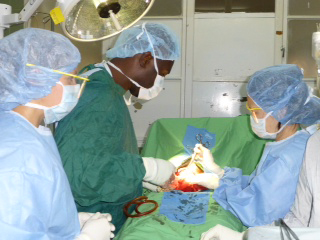Harvard Medical School Program in Global Surgery and Social Change

The Program in Global Surgery and Social Change (PGSSC) in the Department of Global Health and Social Medicine at Harvard Medical School seeks to achieve excellence and equity in global surgical and anesthesia care through leadership and innovation in education, training, research, clinical care, and advocacy. Projects undertaken by the PGSSC consist of sustainable efforts to improve delivery of quality surgery and anesthesia in low- and middle-income countries in the Americas, Africa, and the Caribbean. Through the Paul Farmer Global Surgery Research Fellowship, surgical residents are able to obtain the medical and non-medical skills they need to improve the health of some of the world’s most impoverished people. Interested fellows may incorporate a Masters of Public Health degree during their fellowship. John G. Meara, MD, is the Director of the Harvard PGSSC and is Chief of Plastic Surgery at Boston Children’s Hospital. Surgical faculty at BIDMC who are members of the Program in Global Surgery and Social Change include Christopher Boyd, MD and Stephen Odom, MD.
Paul Farmer Global Surgery Fellowship
Surgeons associated with Harvard teaching hospitals, in conjunction with Boston Children’s Hospital (BCH), Partners In Health (PIH), and the Program in Global Surgery and Social Change (PGSSC) at Harvard Medical School are addressing the need for a surgical role in global health through the Paul Farmer Global Surgery Fellowship. In this fellowship, dedicated surgeons and surgeons-in-training are able to obtain the medical and non-medical skills they need to improve the health of some of the world's most impoverished people.
The Paul Farmer Global Surgery Fellowship is a one or two year program designed for medical professionals who have either already completed their surgical residency or are taking a scheduled break from formal training to conduct research.
Interested fellows in either track may incorporate a Masters of Public Health degree during their fellowship, but this option is not compulsory. The MPH degree can be started through the Summer Program in Clinical Effectiveness at the Harvard School of Public Health. Obtaining an MPH will require a separate application to the Harvard School of Public Health. Tuition and fees associated with matriculation in the MPH program will be the responsibility of the Fellow unless otherwise specified.
